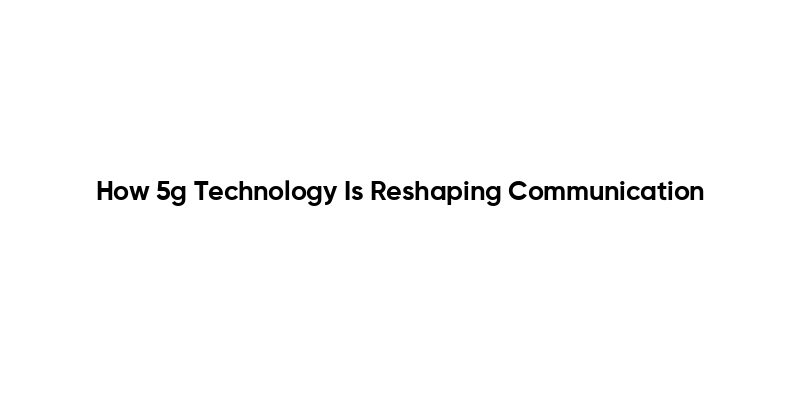The advent of 5G technology marks a revolutionary shift in the way we communicate. With its unparalleled speed, reduced latency, and increased capacity, 5G is set to transform not only personal communication but also the very fabric of industries worldwide. As we delve into the intricacies of how 5G technology is reshaping communication, we will explore its impact on various sectors, including healthcare, transportation, and entertainment, while also addressing the challenges and opportunities that come with this technological leap.
In the following sections, we will uncover the key features of 5G technology that distinguish it from its predecessors, such as 4G and LTE. You will learn how these advancements facilitate real-time communication, enhance user experiences, and enable the Internet of Things (IoT) to flourish. Additionally, we will discuss the implications of 5G on global connectivity and how it paves the way for innovations like smart cities and autonomous vehicles.
As you continue reading, you will gain insights into the potential challenges that accompany the rollout of 5G networks, including infrastructure requirements and security concerns. By understanding both the benefits and hurdles of this transformative technology, you will be better equipped to appreciate its role in shaping the future of communication. Join us on this journey to discover how 5G technology is not just a trend, but a fundamental shift that will redefine our connected world.
Enhanced Mobile Broadband
5G technology significantly enhances mobile broadband capabilities, providing users with faster data speeds and more reliable connections. With download speeds reaching up to 10 Gbps, users can stream high-definition videos, download large files, and engage in real-time gaming without interruptions. This improvement in speed and reliability is crucial for both personal and professional communication, allowing for seamless video conferencing and collaboration tools.
Moreover, the increased bandwidth of 5G allows for more devices to connect simultaneously without degrading the quality of service. This is particularly important in urban areas where network congestion can be a significant issue. As more people rely on mobile devices for communication, the ability to maintain high-quality connections becomes essential for both everyday users and businesses.
Internet of Things (IoT) Integration
5G technology plays a pivotal role in the expansion of the Internet of Things (IoT), enabling a vast network of interconnected devices. With its low latency and high capacity, 5G allows for real-time communication between devices, which is essential for applications such as smart homes, autonomous vehicles, and industrial automation. This integration not only enhances communication but also improves efficiency and productivity across various sectors.
The ability to connect millions of devices simultaneously means that businesses can leverage IoT solutions to gather data, monitor systems, and optimize operations. For instance, smart sensors in manufacturing can communicate with machines to predict maintenance needs, reducing downtime and costs. As IoT continues to grow, 5G will be at the forefront, reshaping how we interact with technology and each other.
Revolutionizing Remote Work
The COVID-19 pandemic accelerated the shift towards remote work, and 5G technology is set to revolutionize this trend further. With faster internet speeds and more reliable connections, employees can work from anywhere without the limitations of traditional broadband. This flexibility enhances communication through high-quality video calls, instant messaging, and collaborative platforms, making remote work more efficient and productive.
Additionally, 5G enables the use of augmented reality (AR) and virtual reality (VR) tools in remote work settings. These technologies can facilitate immersive meetings and training sessions, allowing teams to collaborate as if they were in the same room. As businesses continue to embrace remote work, 5G will be a critical enabler of effective communication and collaboration.
Smart Cities and Infrastructure
5G technology is a cornerstone for the development of smart cities, where communication infrastructure is integrated with urban planning. By enabling real-time data exchange between various city services, 5G can improve traffic management, public safety, and energy efficiency. For example, smart traffic lights can adjust their timing based on real-time traffic conditions, reducing congestion and improving air quality.
Furthermore, 5G facilitates better communication between emergency services and city management systems, enhancing response times during crises. As cities become smarter, the role of 5G in facilitating communication between citizens and city services will be crucial, leading to improved quality of life and more efficient urban environments.
Security and Privacy Challenges
While 5G technology offers numerous benefits, it also presents new security and privacy challenges. The increased number of connected devices and the complexity of networks can create vulnerabilities that malicious actors may exploit. Ensuring secure communication in a 5G environment is paramount, as breaches can lead to significant data loss and privacy violations.
To address these challenges, stakeholders must prioritize the development of robust security protocols and frameworks. This includes implementing end-to-end encryption, regular software updates, and comprehensive user education on cybersecurity practices. As 5G continues to reshape communication, addressing security and privacy concerns will be essential to maintain user trust and protect sensitive information.
| Aspect | Description |
|---|---|
| Speed | 5G technology offers significantly higher data transfer speeds compared to its predecessors, enabling faster downloads and smoother streaming experiences. |
| Latency | With reduced latency, 5G allows for real-time communication, which is crucial for applications like online gaming, virtual reality, and autonomous vehicles. |
| Capacity | 5G networks can support a larger number of devices simultaneously, making it ideal for densely populated areas and the growing Internet of Things (IoT). |
| Reliability | Enhanced reliability in connections ensures that communication remains stable, which is vital for critical applications in healthcare and emergency services. |
| New Applications | 5G technology paves the way for innovative applications such as smart cities, telemedicine, and advanced manufacturing, transforming various industries. |
| Global Connectivity | 5G aims to bridge the digital divide by providing high-speed internet access to remote and underserved areas, fostering global communication. |



